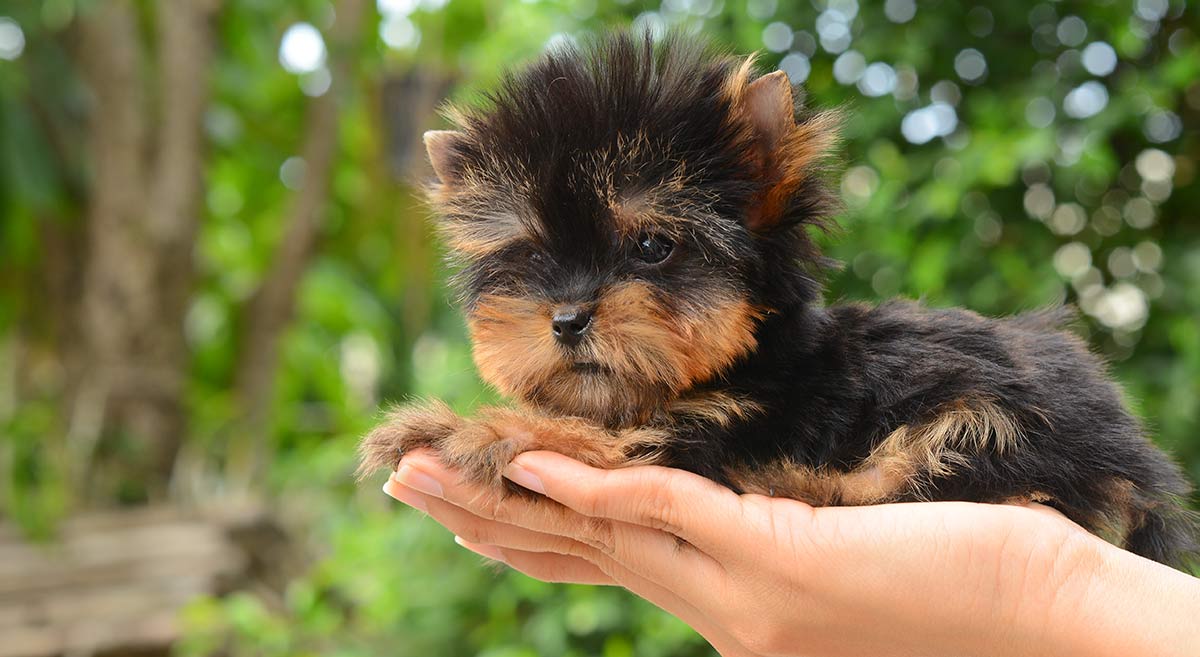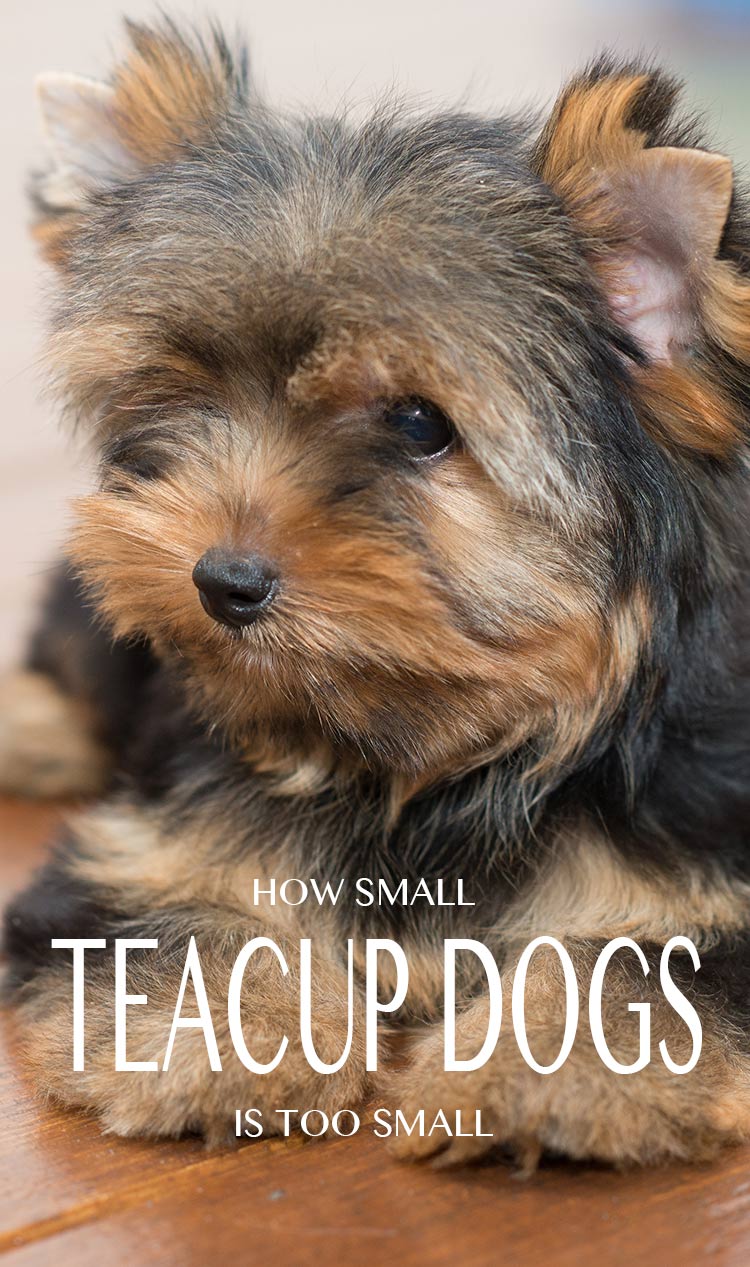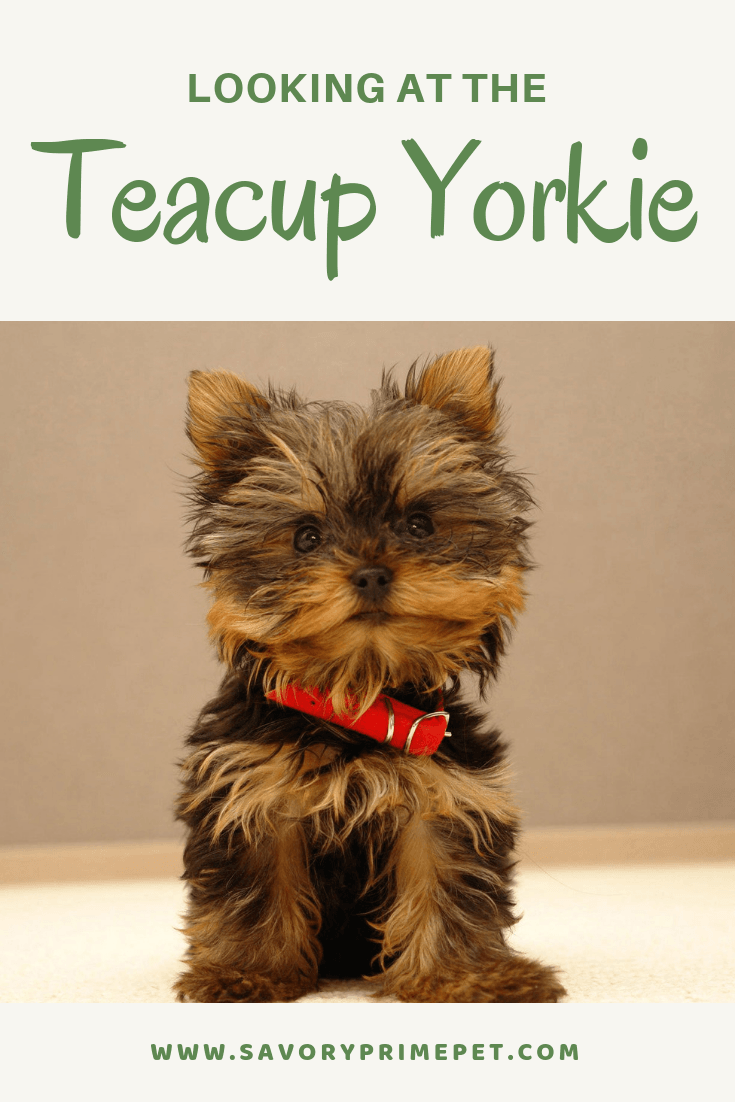Savory Prime looks at the growth in interest in Teacup Yorkies and investigates what lies behind the popularity of the mini Yorkshire Terrier
I recently bought a copy of the Guinness book of records. There were two surprises for me in the dog section.
One was that there was just one page in the entire book devoted to dogs.
I found this extraordinary bearing in mind our long history and association with our canine companions.
The other surprise was that the world’s smallest dog is no longer a Chihuahua.
That accolade has now passed to the Yorkshire Terrier.
And not just any old Yorkshire Terrier, but a miniature or teacup Yorkie.
What is a mini Yorkie?
A mini Yorkie is a Yorkshire Terrier that has been miniaturized, making it significantly smaller than the standard for the breed.
The AKC Yorkshire Terrier breed standard states that the Yorkie should weigh no more than 7lbs.
In practical terms many pet Yorkies weigh a bit more than this. But this is still, relatively speaking, a tiny dog.
When an already small toy dog like the Yorkshire Terrier is miniaturised still further, it becomes a very small dog indeed.
Why do we call them Teacup Yorkies?
Some mini Yorkies are so small that they can literally fit in a teacup – hence the term ’Teacup Yorkie’.
These dogs are likely to weigh between two and four pounds.
Teacup Yorkies are not a ‘recognised breed’, but are usually pedigree Yorkshire Terriers that have simply been bred much smaller than average.
Teacup dogs and controversy
Teacup Yorkshire Terriers are not a new ‘breed’ of dog. If the mini Yorkie puppies you have your eye on are pedigree dogs, then they are simply registered as Yorkshire Terriers in the same way as any other regular sized Yorkshire Terrier.
Teacup dogs are not restricted to the Yorkshire Terrier breed, other toy breeds have been miniaturized too.
And this makes a lot of people quite mad.
If you are thinking of buying a teacup puppy, you probably need to know why teacup Yorkies and other teacup dogs are so controversial!
Not just because you may find yourself the target of some criticism for your choice of puppy. But because it is important to recognize the challenges and downsides of miniaturising dogs.
So we’ll be looking at the teacup dog debate as we go. Let’s first look at why so many of us adore tiny dogs.
What is the appeal of mini Yorkies?
Why do we love tiny dogs? And why do we want them to be even tinier?
There are a few key reasons. One is the very human need to nurture a baby animal, and another is perhaps a little more complex.
Let’s look our nurturing instincts first.
The retention of baby like features in an adult animal is known as neoteny. It literally means ‘like new’.
Neoteny in dogs
If neoteny means having baby like features, you can see why a dog that is tiny, might be more appealing than a dog that is big.
Baby animals of all species are small and have large heads in proportion to their bodies. So when we see a dog that is especially small, our urge to love and protect it springs into action.
This doesn’t mean we are especially soppy or stupid. It is programmed into us, built into our basic biology, this need or drive to protect babies and baby like creatures.
Miniaturisation isn’t just about neoteny though.
The magic of miniaturization
The idea of shrinking a character to tiny proportions is nothing new.
The giant alien world that awaits a tiny miniature personality has had a sci-fi appeal for generations. Not just in modern cinema. Think of the Lilliput of Gulliver’s travels.
Like many other children of my generation, as a child I was transfixed by stories like ‘The Borrowers’. And fascinated by tiny shetland ponies and Chihuahuas.
Later, I watched my own children’s enchantment as we immersed ourselves in the Indian In The Cupboard, or enjoyed pygmy hippos at the zoo.
Miniaturization is simply fascinating, magical even. There’s no escaping it.
With such a powerful human fascination for miniaturisation, and our natural nurturing instincts for tiny animals, it isn’t surprising that we have brought our power over dogs to bear.
How can something as tiny as a teacup Yorkie still have all the character and characteristics of a dog? It’s extraordinary and even thrilling, isn’t it?
Micro teacup yorkie – how small is too small?
And of course, we humans love a challenge. You’ll find people scouring the internet for ever smaller versions of the teacup yorkie.
You may even see people offering micro teacup yorkies for sale. Presumably these are even smaller…
So, just how small can we make our canine friend while still maintaining the qualities that make him a living, breathing, barking, tail wagging dog.
Have we reached the limits yet? Or can we go further?
These are some of the questions that must pass through the minds of those involved in breeding miniature dogs.
And is there a downside to this process?
Is it possible that this miniaturisation experiment that we humans are carrying out on dogs, could be harmful to the dogs themselves?
Is miniaturization harmful?
The question many people are asking is ” Is miniaturization harmful” and “should we be making our tiny dog breeds even tinier?”
These are tough questions, because our instinct when we see something unbelievably cute and attractive, is to dismiss the negative aspects of owning one, and to focus on the benefits and the appeal.
And there are benefits to owning a very tiny dog. We’ll look at the downsides in a moment.
But first, let’s look at some of the pleasures of owning a very small dog.
The benefits of owning tiny dogs
Some of the downsides of dog owning are fairly well known. Even medium sized dogs are messy and clumsy.
They break things, chew things, and knock people over. Unless impeccably trained, they are difficult to take on public transport, or into public places.
And let’s face it, who these days has time to train their dog to the level we’d all like to enjoy. Or to exercise a demanding full size four legged dynamo.
The benefits of little dogs are that you can often avoid some of these problems.
A more portable, manageable dog
Smaller dogs are more portable and more manageable. They take up less space, shed less hair and generally have less impact on a home than a big dog.
The dog that can sit on your lap and even in your purse, is a very convenient friend. While at the same time still retaining that dog personality that we love so much.
But, it’s important to recognise that you don’t need to buy a miniature or teacup dog to get these benefits.
Many of our small toy dogs are already small enough to meet all these criteria. And there comes a point when the disadvantages of being tiny, start to massively outweigh the benefits.
If you have set your heart on a Teacup Yorkie, this next part is the bit you probably don’t want to hear.
But please do read on. It’s important to be well informed, even if you decide to go ahead.
Health problems in teacup yorkies
The list of health problems caused by miniaturizing our four legged friends, is sadly rather long.
It includes
- Heart problems
- Liver problems
- Brain problems
- Low blood sugar
- Bone problems
- Psychological problems
The teacup puppy’s teeny tiny hearts are more prone to defects and diseases than those of a larger dog. When we make body parts smaller, they don’t always work so well. This is true of the mini Yorkie’s organs.
Add in the fact that many teacup dogs are created using very suspect breeding processes, we’ll look at that in a moment, and the likelihood of a teacup puppy having serious health issues increases still further.
Teacup Yorkie Puppy – brain and bone problems
When we mess with the proportions that nature intended, things can go badly wrong.
Teacup puppies can suffer from brain inflammation, or a build up of fluid inside the skull.
Tiny teacup dog skulls may also have soft spots in them, like the fontanelle in a human baby. But unlike the human infant, the soft spot on a tiny dog’s head never closes. Making them permanently vulnerable to injury and brain damage.
Teacup puppies suffer the added problems of poor bone health. Not just in the skull, but throughout the body. This means that they are very prone to fractures if they fall or are injured.
Teacup dogs – mental health
There have been a number of studies that show mental or psychological health in dogs is linked to size. Psychology Today has produced an interesting report on this topic.
Being a small dog in a big world is probably quite stressful, so it is perhaps not surprising that tiny dogs have more than their share of emotional problems.
Caring for a Teacup Yorkie
Before you decide to go ahead and bring home a teacup Yorkie, you need to think about what is involved in caring for such a tiny dog.
Because your puppy’s bones are so fragile, it is vital that he doesn’t fall or get stepped on. You’ll need to prevent him jumping on and off high (to him) surfaces, or playing with small children.
You’ll also need to be sure that you are around or that someone else is around, to feed him at frequent intervals. Hourly is not too often for some tiny dogs.
This is because he is not able to process enough food to keep his blood sugar levels stable unless fed very often.
You’ll also need to accept that your tiny friend may be difficult, if not impossible, to house train.
Bladder problems are common in teacup dogs and it is very hard to potty train a dog with such a tiny bladder.
Teacup Yorkie Breeders
I mentioned poor breeding practices being a contributory factor to teacup dog health issues earlier. The reason is simple:
To get a smaller than average dog, you need to breed from smaller than average dogs. And in many cases, the smallest dog in a litter is less healthy than its larger littermates.
So instead of selecting the dogs that are going to make the healthiest parents, some breeders are selecting the smallest, with no regard for the health problems that they are inflicting on the next generation.
The reason, of course, is money.
In pursuit of the tiniest puppies to sell to those clamoring for teacup dogs, these breeders are disregarding health and thinking only of the dollars they’ll be receiving when their puppies leave for their new homes. Which brings us to cost.
Teacup Yorkie Price
Not many breeders are willing to compromise the health of their Yorkshire Terriers in order to satisfy the demand for tiny dogs.
And the demand is high.
That means teacup puppy breeders can charge a lot. And I do mean a lot of money for their pups.
Some teacup puppy websites offer finance to try to encourage buyers to dip into their wallets and make a purchase, and there’s a reason for that.
You can expect upwards of $2,000 dollars for a teacup puppy. And that’s before you start forking out for the vet bills..
But wait – surely there is a way to find a healthy teacup puppy?
Finding a healthy teacup puppy
Many of these above problems occur to some extent already in our toy breeds. Buying a puppy that is even smaller increases the risk of them happening to your dog.
Finding a healthy teacup puppy is therefore a big challenge, one that many veterinary experts would describe as an impossible task.
The problem is, we don’t yet have the means to miniaturize a truly perfect dog.
The truth is that if you want a miniature dog you are going to have to accept a less healthy one. With all the risk and heartache that can bring.
Teacup Yorkies – Summary
I know you all want the best for your dogs, and for that reason, it is my hope that you will be willing to compromise and opt for a slightly bigger version of your dream.
Tiny dogs are incredibly appealing. If you find yourself longing for a Teacup Yorkie, your feelings are very natural and human.
You may even feel that you are ‘rescuing’ this little scrap of life.
But tiny teacup dogs face many problems and every time we purchase a teacup puppy, a breeder will create more teacup puppies to meet the demand.
Many puppy buyers are simply not aware of the possibility that miniaturising a dog could be harmful. I hope that this guide will help to raise awareness of the problems caused by trying to breed ever tinier dogs.
I understand that by writing this I am may be making some people sad. I understand too, that there is great appeal in owning something that is incredibly tiny and yet still incredibly perfect.
The risks and challenges of being a teacup Yorkie owner are very clear – let’s sum up – they include
- Accidents – The risks to your dog of being tiny in a busy human world
- Sickness – The multiple inherent health problems caused by miniaturisation and bad breeding
- Special care – including frequent feeding, potty training problem, and preventing accidental injury
- Poor nutrition and care before purchase – the risks to your puppy of being raised by a breeder that is not concerned by the problems that they are causing and who is motivated purely by money
A puppy is a long term commitment, and should bring joy to the family that he joins. The way to achieve this is to purchase a healthy puppy, from healthy parents, bred by a compassionate and knowledgeable person who puts the welfare of their dogs above all else.
Fortunately, there are many small dog breeds that are relatively healthy and robust and which can make great family dogs
Recent Pet Posts
Blog Categories
Product categories
- Accessories (7)
- Chicken & Veggie Wraps (8)
- Grillers Jerky Tenders (4)
- Jerky Treats (10)
- Made in the USA (9)
- Non-Rawhide Treats (28)
- Beggar Bone (11)
- Bully Sticks (4)
- Butcher Bone (4)
- Cod Skin Fish Treats (3)
- Pork Skin Twists (2)
- Pressed Rawhide Bones & Rolls (16)
- Bones & Rolls (6)
- Pressed Rawhide Bulk (6)
- Twist Sticks (4)
- Savory Munchies (13)
- Supreme Bones & Rolls (48)
- American Rawhide Bulk (16)
- Rawhide Bones (14)
- Rawhide Chips (6)
- Rawhide Rolls & Sticks (12)
- Uncategorized (8)





6 Comments. Leave new
I have a teacup yorkie I simply adore. She was given to me and I would not take any amount of money for her. Love her ❤️❤️
I also have a very small Yorkie… she is 8 months and 1pound 12oz… she was given to me … she was breed to be so small it just happened. Thanks Cherrie
I meant she was not breed to be small
i love this 🙂
I had a beautiful teacup yorkie, King Charles William Henry, for 12 years. He weighed just over 2 lbs. Unfortunately he passed away sleeping next to me last summer. I miss him terribly.
I have a 2.3 pound Yorkie that is 8 years old now and healthy as ever. He’s my best friend and have had people try to steal him.